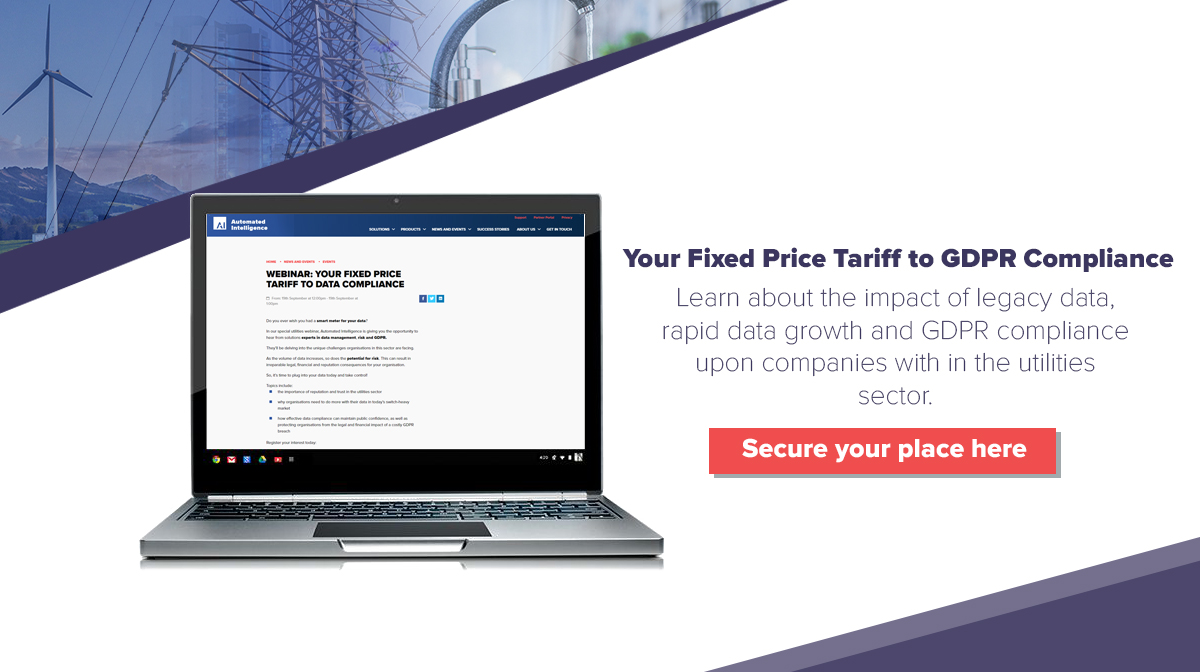Reading time: About 4 minutes
In today’s competitive market, most organisations in the utilities sector understand the need to change and adapt in order to remain relevant and viable.
With so much choice, it is easy for customers to shun long-established brand loyalty and search for the cheapest, flashiest deal. Indeed, switching between suppliers has never been easier.
That’s why, more and more, utilities organisations are now embracing the idea of ‘big data’- using their own corporate knowledge at their fingertips.
But, what does this mean? It’s about using data analytics to make informed, insights-driven, competitive decisions – with the result being personalised customer messages, lower service costs and most importantly, helping to retain trust in this ‘switch-heavy’ market.
However, there are many challenges in the utilities sector which mean that the end goal of using company data for powerful data insights is a long way off.
In this blog we look at three common data challenges facing the industry today:
- Increasing amounts of data– We know that more data is being created than ever before in all sectors, but there has been an explosive growth of data within utilities organisations. A key example of this is the use of smart meters which generate a vast amount of data, so that customers can use up-to-date information to make changes to their energy consumption. Compare these half-hour meter readings to the traditional 6-month data captures! That’s a lot of information! What’s more, gas and electricity suppliers in the UK are now required to roll out smart meters to all their domestic and small business customers by the end of 2020, so this data growth is expected to only increase further. It’s important for organisations to continually review their data (particularly historical or legacy data) so they don’t end up keeping what they no longer need – and end up paying huge costs to store it unnecessarily.
- Changing data sources– Not only are smart meters changing the way data is captured but the utilities sector now has so many different, varied data sources- how many of us have contacted our electricity, gas, water or internet providers via Twitter, Facebook or via online chats? (Or a combination to guarantee a response!) We bet it’s a lot. Think about the amount of text which must be compiled from all these different sources. Additionally, there’s also an increasing amount of audio captured today via telephone conversations which must be transcribed. Text is often preferred to audio sentiment analysis, and of course, it makes it much easier to search for specific information, particularly for GDPR.
- Lots of PII data- So GDPR leads us nicely to the risk of holding personal and sensitive information. When you phone a utility provider, it is likely you will be asked personal questions to verify your identity. What’s your date of birth? What’s your telephone number? What’s your mother’s maiden name? It’s also likely most of this will be in audio form so again, transcript here is essential for any Subject Access Requests (SARs) you may receive. It’s expected that organisations in this space will receive a more than average number of SARs due to switching providers being much easier than before. One of our utility customers has told it is was taking them 40 hours to complete one SAR, but that has now been reduced to just minutes due to a content analysis of its entire data estate meaning PII is easy to surface.
The utilities industry is facing many specific data challenges, but they can be overcome in order to leverage the information.
Solutions like data analysis, data cleansing to remove old or redundant data, audio transcription, and GDPR workflows to aid Subject Access Requests all mean that organisations can now start to do more with their data, while reducing potential governance risks and service costs.
We all want to feel valued as customers so trust in this space is vital. Taking control of data means that utilities organisations can now offer a new approach to customer service and engagement. Why not make the ‘switch’ to Automated Intelligence today?
If you work in the utilities sector and these challenges sound familiar, sign up to our exclusive Utilities Webinar on 18th September. To view the agenda and to register, visit our event page today.






